EQUINE WELFARE NETWORK PROFILE
Save a Forgotten Equine

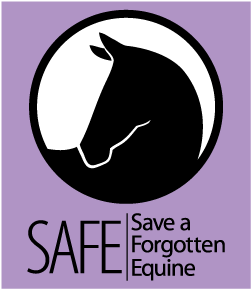
Save a Forgotten Equine
10407 192nd Ave NE
REDMOND, WA 98053
Mailing Address:
PO Box 2769
REDMOND, WA 98073
Phone: 360-692-3611
MAKE AN INQUIRY
View our WEBSITE
EIN: 20-5825355Founded: 2005
View our PHOTO GALLERY
Profile Last Updated January 11, 2026Public Charity
NEXT CHAPTERS! Click here to view listings of our adoptable equines: Barb - Bridget - Brownie - Jacob - Mabel - Ranger - Tiva - Veronica
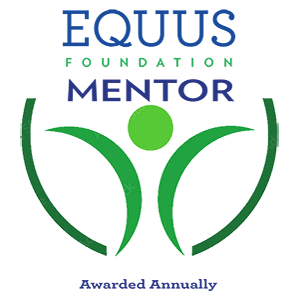
2025
The Mentor Accreditation is awarded annually to an organization that operates at the highest standards for business and equine welfare practices in accordance with EQUUS Foundation guidelines for business and equine welfare practices outlined here.
Awarded Annually
Last Updated: September 21, 2025
Last Updated: September 21, 2025
MISSION & PROGRAMS
Mission:Our mission: To rescue, rehabilitate, and re-educate horses facing neglect or abuse and provide them with the best opportunity for a permanent home and a lifetime of safety.
Our organization provides programs involved with equine rescue & adoption
Our organization provides outreach and/or public education programs involving horses.
100% of our total programs and services are equine-related.
Our organization is directly responsible for the care and shelter of equines involved in our programs.
Our organization does not CURRENTLY use satellite, overflow, foster, and/or outreach facilities.
Please describe what steps your organization takes to ensure that:
1) all interactions between your equines and people are mutually beneficial and conducted in accordance with the Guidelines for Human-Equine Interactions stated below;
2) all equines in the care of our organization and/or equines that participate in the organization's program have access to clean drinking water at all times; nutritious food in sufficient quantity, including natural forage such as pasture grass and/or hay; appropriate veterinary, farrier, and dental care; shelter and protection from the weather; sufficient safe space to move around comfortably on a daily basis; and daily opportunity to freely interact and have contact with other equines:
Interactions between humans and equines at SAFE continue to be conducted with the utmost respect for the comfort and dignity of the horses in our care. The majority of our horses come to us after suffering severe neglect, abuse, or starvation, so we have to provide extremely personalized care to each of them. We need to learn who they are and more importantly, allow them to learn who we are and what our intentions are toward them. It's remarkable how so many horses have the ability to meet us with a clean slate, and without holding grudges about humans from their pasts who failed them. This is not to say that neglected or abused horses don’t find it difficult to trust new people, but it seems like most of them are willing to give us a chance to earn that trust. Horses are very good judges of character, and it’s all too clear to us that most of them understand that we mean them no harm and that we are here to help.
Horses at SAFE are given the time and care to fully recovered from neglect or abuse, before they are brought into our horsemanship program. There they are given a solid education, using training methods pioneered by Buck Brannaman, Ray Hunt, and Tom Dorrance. Horses are taught to move away from pressure and not feel “stuck” which helps them gain confidence and feel more secure. They are taught boundaries – not by domination but by demonstrating that the desired behavior means that pressure goes away. They are always given the opportunity to find the right answer, and the smallest amount of “try” is rewarded with a release. Horses in our horsemanship program work on their own schedule: however long it takes it how long it takes. If all you get in a session is one tiny improvement or change, then that session is a success. Some of our horses cannot be ridden due to obvious physical or age-related issues, but others let us know in subtle ways that they are unable to tolerate more challenging levels of work. These horses become companions, and we find them homes where they can be happy and well cared for as pets and friends. But even our companions are given a solid education so that they can be safe and pleasant to be around. This is the best way we know to ensure that they will never end up back in the rescue pipeline.
Horses at SAFE receive the very best of care. With three volunteer shifts every day of the week, our horses have clean drinking water, clean paddocks or stalls, nutritious hay to eat, and whatever they require in terms of grain and nutritional supplements every day. They are seen once a year by the vet for routine annual checkups including vaccinations and dental care, and if they display any signs of illness, injury, or lameness, we’ll have the vet out to figure out what is wrong. The majority of our horses are kept barefoot, and they are trimmed by a farrier every 5-6 weeks. Horses spend every day outside in paddocks and pastures where they have shelters to protect them from the sun or the rain, and sufficient space to move around and interact with their paddock mates. Most of our horses also participate in horsemanship sessions 3-5 days per week where they are either ridden or worked in a round pen for exercise, education, and stimulation. Our older horses are hand walked around the property by volunteers who have been trained to handle them safely, and many of our horses are groomed by volunteers daily as well. We are always striving to improve their quality of life in any way we can, and our annual budget reflects this. We have the financial stability and support to be able to do things like diagnostic vet care or minor surgical procedures when it’s appropriate. We also have a palliative care program so we can provide the care necessary to keep older horses healthy and comfortable with an understanding that heroic measures will not be taken to extend these horses’ lives. And we will not hesitate to humanely euthanize a horse that is in severe pain or distress.
SAFE’s horses receive the absolute best care from hardworking staff and volunteers who love and respect them, and who will always put the horses’ best interests first.
Equine Transition Services:
Overview of our programs involved with rescue, rehabilitation, retraining, re-homing and/or retirement:
Since 2005, Save a Forgotten Equine (SAFE) has been rescuing and rehabilitating horses that have been starved, neglected, abused or are unwanted. We have formal agreements in place with Animal Control agencies in King, Pierce, and Snohomish counties to support their fight to protect horses in this region. SAFE also provides assistance to horse owners struggling to care for their animals in the current economy.
SAFE is deeply committed to its rescued horses. We have extensive experience in equine rehabilitation and have successfully brought many neglected horses back from the brink of starvation. All of our horses are provided with routine vet care, dental care, vaccinations, and farrier care. Once a horse has been successfully rehabilitated, we carefully evaluate them to discover their strengths and suitabilities, and we provide many of these horses with professional training to help ensure them a safe and productive future. While at SAFE, horses receive a lot of personal attention and handling. Our rideable horses are worked on a regular basis by our on-staff trainer and by qualified volunteer riders under her supervision.
Once a horse is ready for a permanent home, SAFE undertakes a rigorous screening process to find the ideal placement. We carefully review applications, check references, and conduct site visits, with the goal of finding a long-term home that will benefit both horse and adopter. After a horse is placed into its forever home, annual follow-up visits are conducted to ensure the animal’s continued well-being and SAFE will take a horse back if its adopter can’t continue to care for it.
Despite our years of success helping horses in the local area, SAFE remains a small, modest organization that operates on a shoestring budget and works hard to make every penny count. We rely on public donations to pay the majority of our operating expenses. The funds we raise are used to feed, house, care for and train our horses…essentially paying for everything needed to ensure them a safe and productive future. We have minimal management expenses, and only five paid full time employees. The heart of SAFE is our volunteers — from our Board of Directors to the more than 150 volunteers who handle the day to day care of the horses — an incredible group of people who believe in SAFE’s mission and give the best of their talents and energy to make it succeed.
Outreach and/or Public Education:
Our Community Outreach Program offers short term assistance to horse owners facing difficulties caring for their horses. We will provide up to three months of hay and vet vouchers to owners who can demonstrate a reasonable plan to improve their situation. We also offer no-questions asked gelding vouchers, and through our Serenity Fund, we will assist with the costs of humane euthanasia and removal.
SAFE runs a Community Hay Bank to help horse owners who are struggling to feed their animals. This hay bank was created in 2020 following the start of the pandemic.
Our Mayday Program is designed to help with emergency dispersal of large herds of neglected or abandoned horses.
We are developing a formal program of public education through short videos that show our way of caring for our horses. These videos are available on our YouTube channel.
Our Level Up Program for volunteers helps them learn more about horse care, vet care, and horsemanship, earning certification at each level. We encourage people who are new to horse ownership to take part in our volunteer program prior to adopting a horse, so they can get a better idea of what is involved with caring for a horse.
Research/Medical Use of Equines:
Our organization has never made, and would not ever consider making, equines available for research studies or medical training that involves invasive procedures and/or that which may cause pain or suffering to the equine.
Religious Affiliation:
Our organization does not promote religious education, religious purposes, or a specific religious faith or use donations for religious education or religious purposes; require participants to be of a certain faith; require participation in religious, instruction, activities or services; or require participation in prayer, worship, religious instruction or other religious activities as a condition of receiving social or secular services offered.
Auction Donation:
Our organization has never allowed, or would not consider allowing, an equine to be sold, transferred, released, or otherwise placed into possession of any person or organization that would cause or allow the equine to be sold at auction for slaughter.
Our Programs/Activities that are not equine-related and/or involving animals other than equines:
SAFE does not have non-horse related programs.
POLICIES: INTAKE, ASSESSMENT & TRAINING
Prior to a horse being accepted and/or arriving at the facility, the organization has the following policies in place:The owner of a potential equine is interviewed over the phone or in person prior to seeing the equine
The owner completes an application/contract which constitutes the agreement between the owner and our organization when the equine is acquired from the equine's owner other than by seizure or by abandonment
If health records are not available or are out-of-date, our veterinarian will administer appropriate vaccinations
Not Checked:
The equine is evaluated at its place of residence
The owner is financially responsible for the shipping of the equine to and from the organization
A health certificate signed by a veterinarian and dated no more than seven days prior to arrival is provided to our organization either prior to or upon arrival of the equine attesting to the health status of the equine
The equine is evaluated at its place of residence
The owner is financially responsible for the shipping of the equine to and from the organization
A health certificate signed by a veterinarian and dated no more than seven days prior to arrival is provided to our organization either prior to or upon arrival of the equine attesting to the health status of the equine
Trial Period: Check all that apply:
Equines are not taken on trial
Upon intake, the organization has the following quarantine policy in place:
The equine is confined to a designated and separate area for isolation and quarantine at the facility for a prescribed period of time
The equine is confined to a designated and separate area for isolation and quarantine off-site for a prescribed period of time
Not Checked:
The equine is not quarantined
The equine is not quarantined
The typical length of quarantine is: 20 to 30 days
Following arrival of the equine at the facility, the following is performed:
Physical examination to include temperature, pulse and respiration by a trained staff member upon arrival
A Henneke Body Conditioning Score or other body conditioning score is assigned by a veterinarian upon arrival
Photographs are taken of each equine upon arrival at the facility and kept with the equine's health records
Physical examination by a farrier
The equine is microchipped if the equine has not been microchipped
Not Checked:
Physical examination to include temperature, pulse and respiration by a veterinarian upon arrival
A Henneke Body Conditioning Score or other body conditioning score is assigned by a trained staff member upon arrival
Physical examination by a dentist
Physical examination to include temperature, pulse and respiration by a veterinarian upon arrival
A Henneke Body Conditioning Score or other body conditioning score is assigned by a trained staff member upon arrival
Physical examination by a dentist
Horses are assessed for following skills and behaviors:
Retrieval from a pasture/paddock
Leading with a halter and lead rope
Temperament, disposition and attitude, such as rated from very calm to very high spirited
Saddling
Bridling
Loading onto and unloading off a trailer
Mounting and dismounting
Riding at the walk
Riding at the trot
Riding at the canter
Riding by a beginner and/or unbalanced rider
Tolerance to unusual objects and loud noises
Known vices, i.e., cribbing, biting, kicking, weaving, stall walking, etc
Grooming
Bathing
Clipping
Not Checked:
Lunging
Jumping
Driving (Pulling a carriage)
Tolerance to multiple handlers at the same time
Lunging
Jumping
Driving (Pulling a carriage)
Tolerance to multiple handlers at the same time
Our organization has the following policies and procedures in place pertaining to the ongoing assessment of horses in its care:
Physical examination by a veterinarian at least annually
The Henneke Body Condition score or other body conditioning score is updated at least annually by the veterinarian
Vaccinations are administered at least annually
Equines at our facility may be treated by an equine chiropractor
Equines at our facility may be treated by an equine acupuncturist
Equines at our facility may be treated by an equine massage therapist
Equines at our facility may be treated by an equine nutritionist
Not Checked:
The Henneke Body Condition score or other body conditioning score is updated at least annually by a trained staff member
Photographs are taken of each equine monthly and kept with the equine's health records
Photographs are taken of each equine annually and kept with the equine's health records
The Henneke Body Condition score or other body conditioning score is updated at least annually by a trained staff member
Photographs are taken of each equine monthly and kept with the equine's health records
Photographs are taken of each equine annually and kept with the equine's health records
Our organization has the following policies and procedures in place pertaining to the weight-carrying or workload capabilities of horses/equines that are ridden in our care:
Our organization evaluates the weight-carrying and workload limitations for each equine that is ridden at least annually
Our organization maintains a written record of the weight-carrying and workload limitations for each equine that is ridden
Not Checked:
Our organization does not evaluate the weight-carrying and workload limitations for each equine that is ridden
No equines are ridden; not applicable
Our organization does not evaluate the weight-carrying and workload limitations for each equine that is ridden
No equines are ridden; not applicable
The following variables are considered in determining the weight-carrying and workload limitations for each equine that is ridden:
Equine age, weight, breed, body condition, fitness, balance, health and soundness
Equine conformation to include the top line, length of back, strength and width of loin, bone density (measured by the circumference of the cannon bone just below the knee)
Size, shape, condition and angle of the hooves
Participant weight, height, body proportions, balance, fitness and riding skills as well as behavioral issues and safety concerns
Weight and proper fit of the saddle and other equipment
Terrain and footing in the working environment
Nature and pace of work, repetitive or varied, radius of turns, degree of incline and regularity of footing when equine is subject to maximum weight-carrying capacity
Temperature and/or weather conditions
Seasonal impact on the equines' workload and weight-carrying capabilities and limitations
Not Checked:
Duration and frequency of working sessions, as the frequency with which an equine is subjected to maximum weight carrying and/or workload
Our organization does not evaluate the weight-carrying and workload limitations for each equine that is ridden
No equines are ridden; not applicable
Duration and frequency of working sessions, as the frequency with which an equine is subjected to maximum weight carrying and/or workload
Our organization does not evaluate the weight-carrying and workload limitations for each equine that is ridden
No equines are ridden; not applicable
Horses provided formal training (groundwork or riding): 2-3 times per week
POLICIES: BREEDING
The organization has the following policies related to breeding and stallions:Our organization does not conduct breeding of equines owned or under the care of our organization.
The main facility where our organization conducts its programs does NOT breed equines.
Not Checked:
One or more of the facilities where our organization conducts its programs, including foster/temporary care facilities, breeds equines
One or more of the facilities where our organization conducts its programs, including foster/temporary care facilities, are permitted to house stallions
One or more of the facilities where our organization conducts its programs, including foster/temporary care facilities, breeds equines
One or more of the facilities where our organization conducts its programs, including foster/temporary care facilities, are permitted to house stallions
POLICIES: EUTHANASIA
The organization has the following policies related to euthanasia:Our organization will never have an equine euthanized for space
Our organization will have an equine euthanized upon the recommendation of the veterinarian if the equine is a threat to itself, other equines, or people
Our organization will have an equine euthanized upon the recommendation of the veterinarian after all reasonable treatment options have been explored
Euthanasia is done on site when possible to decrease trauma from transport
Euthanasia is done at the veterinarian's facility
Disposal of the carcass is handled within 24 hours
Not Checked:
Our organization will never have an equine euthanized under any circumstances
Our organization will never have an equine euthanized under any circumstances
The following are authorized to administer the procedure for your organization in accordance with state laws:
Veterinarian
Not Checked:
A certified euthanasia technician
Senior staff with appropriate training
Employee of animal control shelter or humane society with appropriate training
Veterinary student under the supervision of a licensed veterinarian
Not applicable. Our organization prohibits euthanasia under any circumstances
A certified euthanasia technician
Senior staff with appropriate training
Employee of animal control shelter or humane society with appropriate training
Veterinary student under the supervision of a licensed veterinarian
Not applicable. Our organization prohibits euthanasia under any circumstances
POLICIES: RE-HOMING
View Re-homing AgreementOur organization has the following re-homing (adoption/purchase) policies and procedures in place:
All potential adopters/purchasers complete a written contract which constitutes the agreement between our organization and the new owner
Our organization will only re-home an equine to a location where another equine resides
Potential adopters/purchasers must visit our organization and be observed with the equine on site
The distance of a potential adopter/purchaser's home from our facility is a consideration for when re-homing an equine
Our organization conducts a site visit of the adopter/purchaser's facility before the transfer of the equine to the adopter/purchaser's facility
Not Checked:
Our organization does NOT re-home an equine to first time equine owners
Potential adopters/purchasers are encouraged to do a short-term, on-site foster with the equine
Adopters/purchasers are NOT required to provide updates
Our organization does NOT re-home an equine to first time equine owners
Potential adopters/purchasers are encouraged to do a short-term, on-site foster with the equine
Adopters/purchasers are NOT required to provide updates
Our organization has the following policies and procedures related to horses that need to be retired, are no longer able to contribute to the mission of the organization, and/or are no longer manageable:
Equines may remain at our organization for their lifetimes
Equines may be found suitable homes by our organization
In the case an equine is unmanageable and demonstrates repeated dangerous behaviors, the equine may be euthanized upon the recommendation of the veterinarian
In the case an equine is unsound and/or unhealthy and cannot be treated to relieve suffering, the equine may be euthanized upon the recommendation of the veterinarian
The organization will accept financial responsibility for equines in the current care of the organization that need to be retired or are no longer able to contribute to the mission of the organization if all alternatives have been explored to find the equine an appropriate placement and space is not available for the equine to remain at the organization.
Not Checked:
Equines may be returned to their owners
Equines may be sent to auction
If a suitable home cannot be located within 12 months, the equine may be euthanized
Equines may be returned to their owners
Equines may be sent to auction
If a suitable home cannot be located within 12 months, the equine may be euthanized
The uploaded Re-homing agreement includes the following re-homing (adoption/purchase) statements:
The agreement reflects that any individual or organization in possession of the equine as of the date of the agreement and any time thereafter is bound to not sell the equine at auction for slaughter or allow the equine to be sold, transferred, released, or otherwise placed into possession of any person or organization that will cause or allow the equine to be sold at auction for slaughter.
The agreement states that should the adopter decide to re-home the equine, the adopter must grant the organization first right of refusal prior to the equine being placed into the possession of any individual or organization intending to take possession of the equine for any reason.
The agreement states that should the adopter decide to re-home the equine, our organization must be notified of the name, address, and telephone number of any individual or organization intending to take possession of the equine for any reason prior to the equine being placed into the possession of such individual or organization.
The agreement states that should the adopter decide to re-home the equine, our organization must grant approval of any individual or organization intending to take possession of the equine for any reason prior to the equine being placed into the possession of such individual or organization, including being provided written notification of the name, address, and telephone number of any individual or organization intending to take possession of the equine for any reason.
The agreement states that the terms of our organization's agreement will be binding on any future individual or organization taking and/or in possession of the equine for any reason.
The agreement states that re-homed equines cannot be bred
The agreement states that if there is any breach of contract the equine must be returned to our organization
The agreement states that our organization reserves the right to make unannounced visits
The agreement states that our organization reserves the right to make scheduled visits
The agreement states that adopters/purchasers can return an equine to our organization free of charge
Our organization microchips all equines that are not already microchipped before the adoption and/or transfer of the equine if the organization has the authority to microchip the equine.
The agreement includes the microchip number of the equine.
The agreement states that adopters/purchasers are required to provide updates (photos, vet records) for as long as the adopter/purchaser is responsible for the care of the equine
Not Checked:
The agreement states that the re-homed equine CANNOT be sold, adopted, transferred, auctioned, released, given away, or otherwise placed into the possession of another individual or organization under any circumstances and must be returned to our organization should the adopter decide that he/she is no longer able, or no longer wishes, to care for the equine.
The agreement states that adopters/purchasers can return an equine to our organization for a fee
The agreement states that adopters/purchasers are required to provide updates (photos, vet records) for one year
The agreement states that adopters/purchasers are required to provide updates (photos, vet records) for two years
None of the statements are included.
The organization does not re-home equines under any circumstances; our organization retains custody of our equines and ensures care of the equines for their lifetimes.
Our organization does not have the authority to transfer ownership and/or does not own any of the equines involved with our programs.
The agreement states that the re-homed equine CANNOT be sold, adopted, transferred, auctioned, released, given away, or otherwise placed into the possession of another individual or organization under any circumstances and must be returned to our organization should the adopter decide that he/she is no longer able, or no longer wishes, to care for the equine.
The agreement states that adopters/purchasers can return an equine to our organization for a fee
The agreement states that adopters/purchasers are required to provide updates (photos, vet records) for one year
The agreement states that adopters/purchasers are required to provide updates (photos, vet records) for two years
None of the statements are included.
The organization does not re-home equines under any circumstances; our organization retains custody of our equines and ensures care of the equines for their lifetimes.
Our organization does not have the authority to transfer ownership and/or does not own any of the equines involved with our programs.
Our organization requires references from the following:
Veterinarian
Farrier
Personal/Other
Not Checked:
Not applicable or no references required.
Not applicable or no references required.
Transfer of ownership occurs: Immediately (at the time of adoption/purchase) or less than one year
The average equine re-homing (adoption/purchase) fee received by your organization:
Over $1,500
Additional information about our rehoming policies and practices:
All horses are adopted with a minimum 30 day trial period in which the adopter can return the horse to SAFE with no restrictions and a refund of the adoption fee. After the trial period is over, the adoption is considered finalized. If the adopter cannot keep the horse at any point in the future, our contract stipulates that they must contact SAFE to discuss rehoming. We permit adopted horses to be rehomed provided that the new home meets our standards and signs a new contract. If we feel that the adopter cannot take responsibility for successful rehoming, we will accept the horse back into our rescue program.
EQUINE CARE & SHELTER/FACILITY INFORMATION
Our organization does not CURRENTLY use satellite, overflow, foster, and/or outreach facilities.Total facilities at which our organization cares for and shelters horses used in our programs: 1
Safe Harbor Stables
10407 192nd Ave NE Redmond WA 98053
Currently operational
Total number of horses/equines currently involved with your programs, under your care, and/or owned by your organization at this facility: 40
Total number of horses at this facility NOT INCLUDING those counted above: 2
Maximum capacity of horses at this facility: 45
Does your organization own, lease or use a part of this facility? Lease
Provide the contact information for the individual or organization responsible for investigating abuse in the county where the facility is located, including mailing address, email address, and phone information.
Regional Animal Services of King County 21615 64th Ave S Kent, WA 98032 (206) 296-7387 Tim Anderson, Interim Manager Tim.Anderson@kingcounty.gov
Does your organization conduct Equine Assisted Services (EAS) at this facility in accordance with the EQUUS Foundation Guidelines on Qualifications of Organizations Conducting Equine Assisted Services (EAS)? No
ADDITIONAL INFORMATION ABOUT THIS FACILITY:
Some horses are stalled 16 hours per night and turned out 8 hours per day. Some horses are turned out 24/7. The number of hours horses are stalled and turned out depends on the horse.
Regarding feeding grain, if a horse shares a paddock with another horse and receives a different type of grain or supplements, that horse will be haltered and taken out of the paddock by a volunteer and given its grain pan outside the paddock while being held by the volunteer. The majority of our horses that receive daily supplements received them in a small amount of soaked Haystack(1-2 cups) that doesn't take long to eat. Horses that receive large amounts of mash are always fed in separate enclosures.
Veterinarian Information: Safe Harbor Stables (*Main) Currently operational
Veterinarian: Dr Robert Fleck, DVM/Susannah Lewis, DVM
Clinic Name: Rainland Farm Equine Clinic
15418 168th Ave NE
Woodinville WA 98072
Phone: 425-483-2255
Grounds: Safe Harbor Stables (*Main) Currently operational
Total acreage dedicated specifically to the horses: 11
Our organization has use of the following at this facility:
Structures/Barns: 1 Run-in sheds: 24
Pastures: 13 Paddocks/Pens/Turnout Areas: 17
Uncovered Outdoor Rings: 1 Covered Outdoor Rings: 1 Indoor Rings: 1
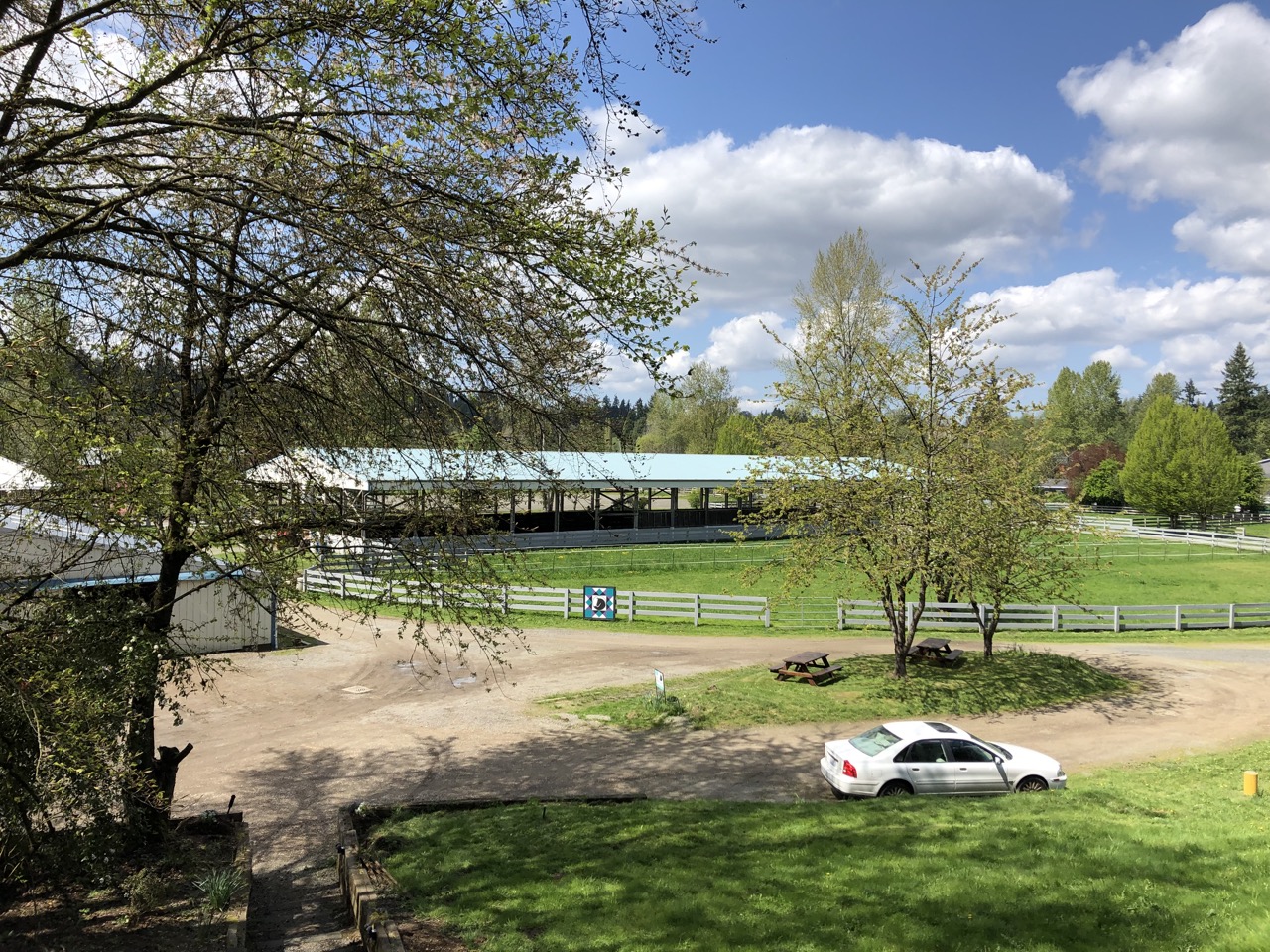
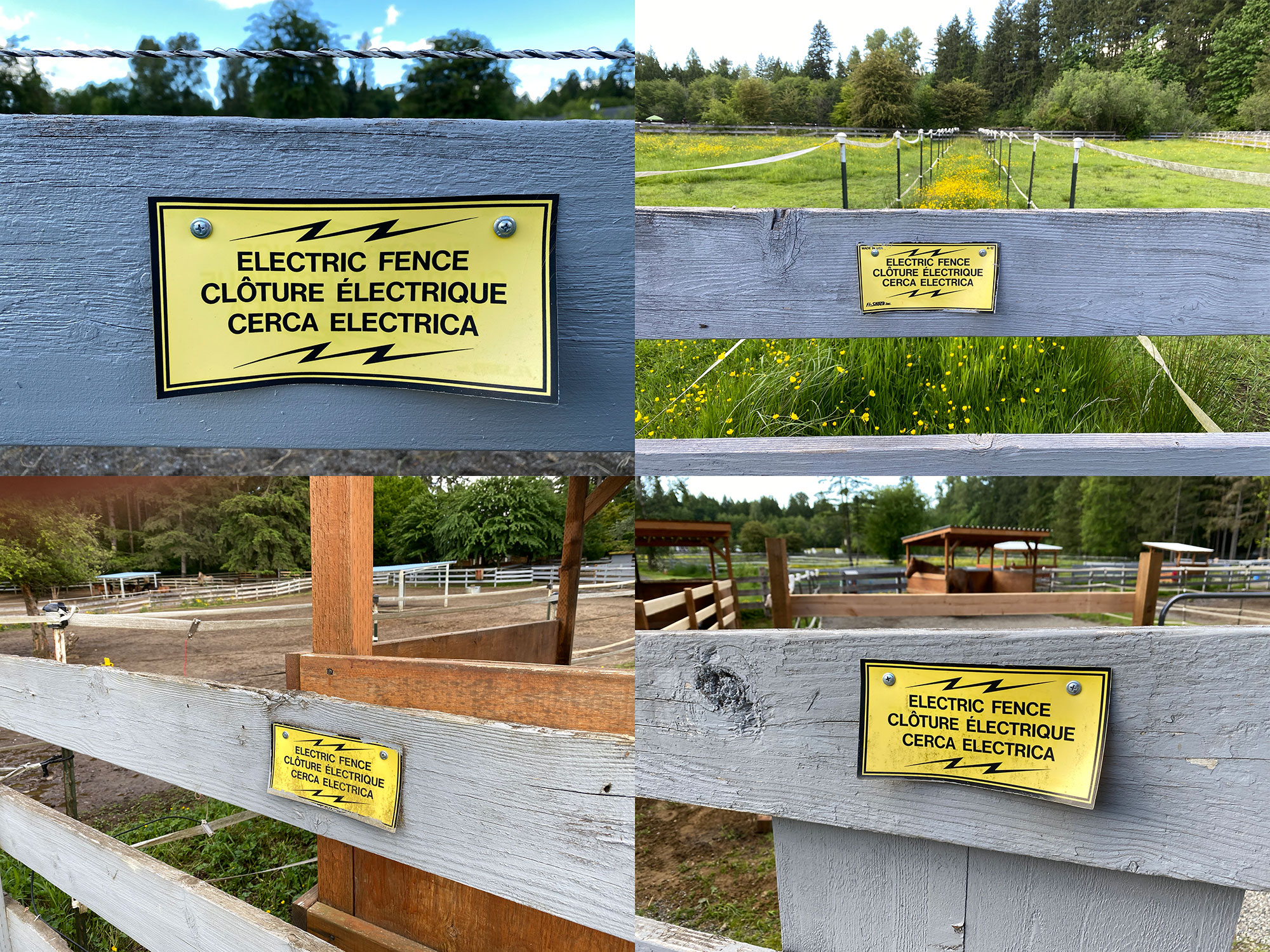
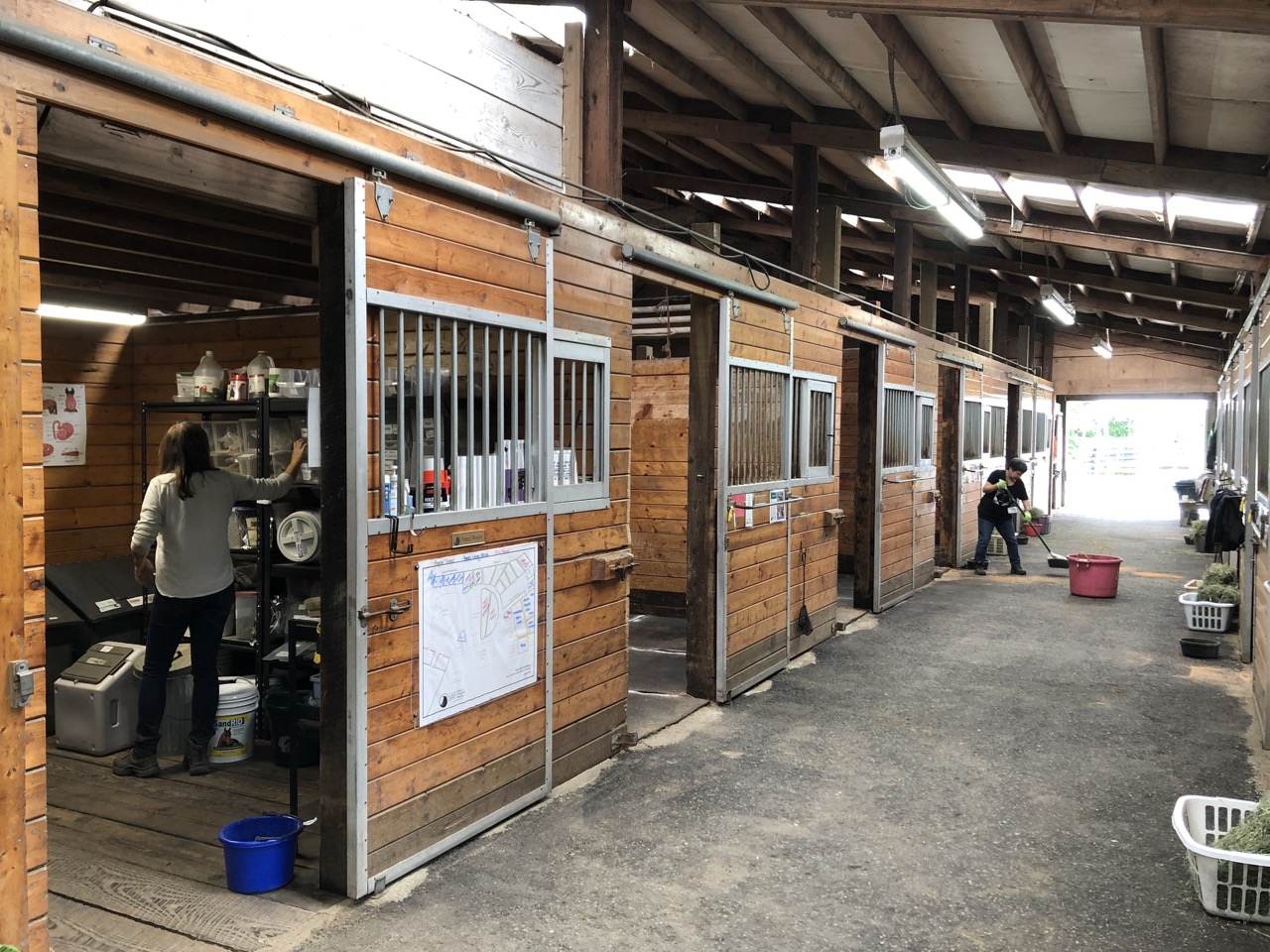
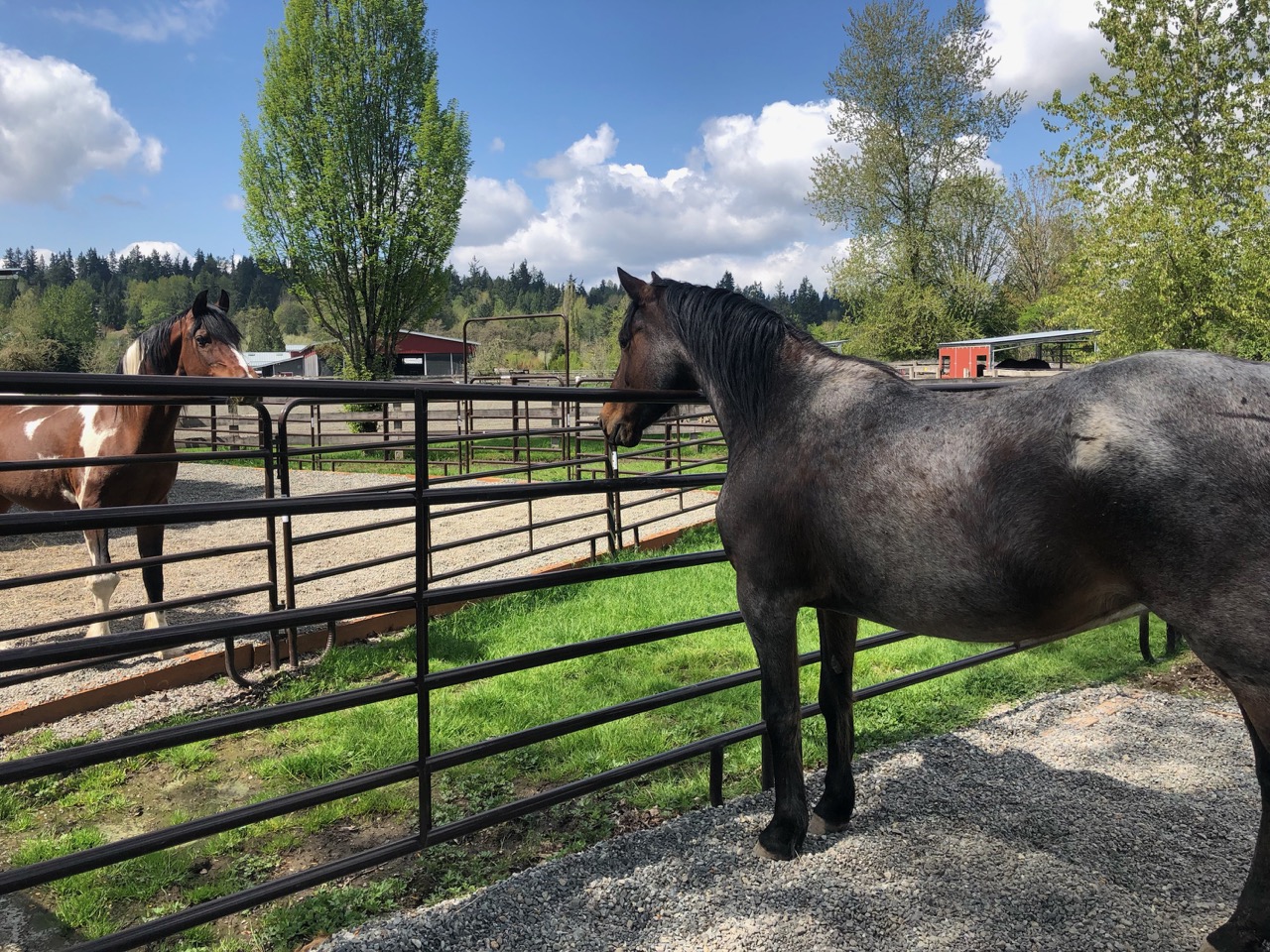
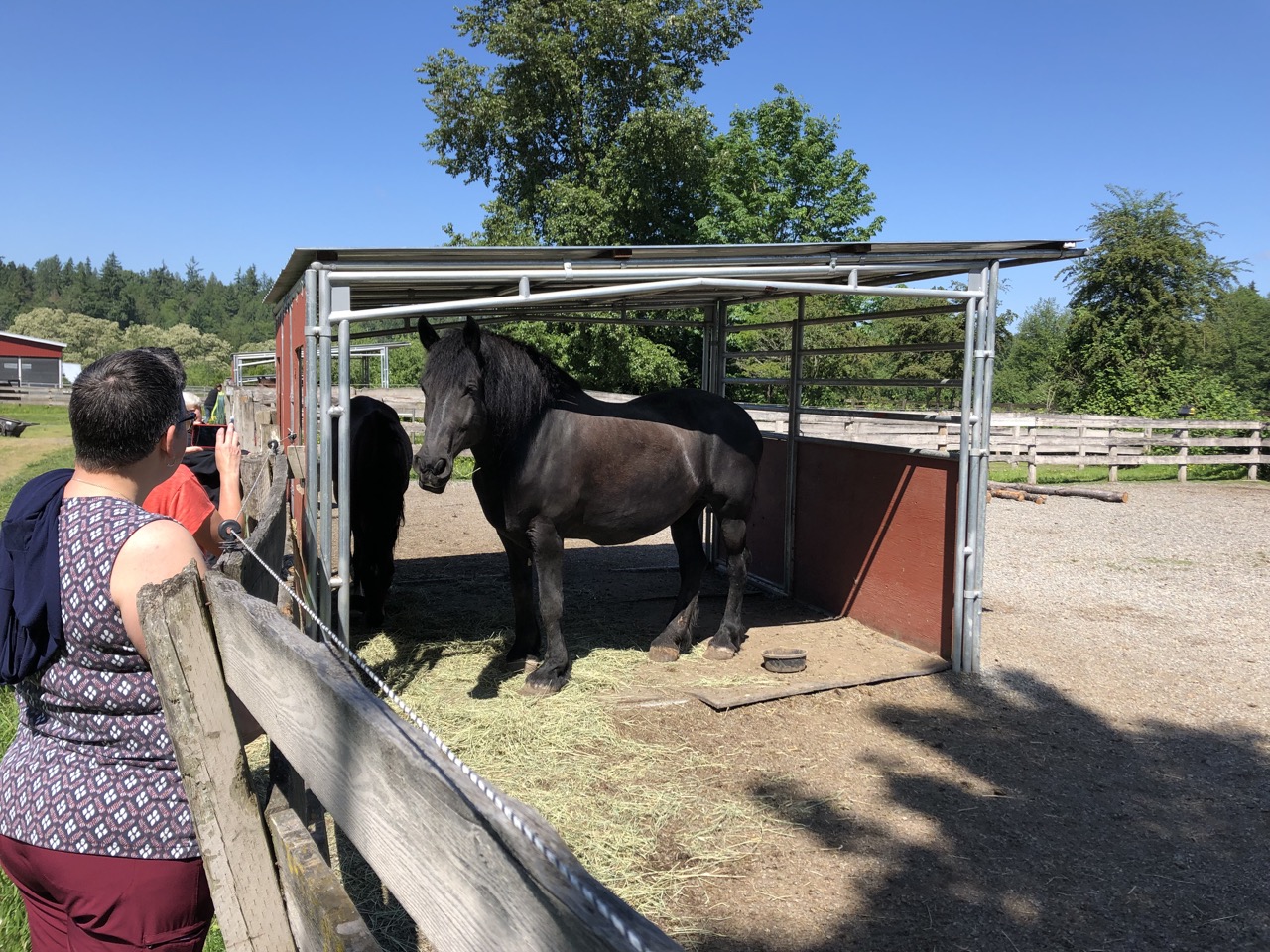
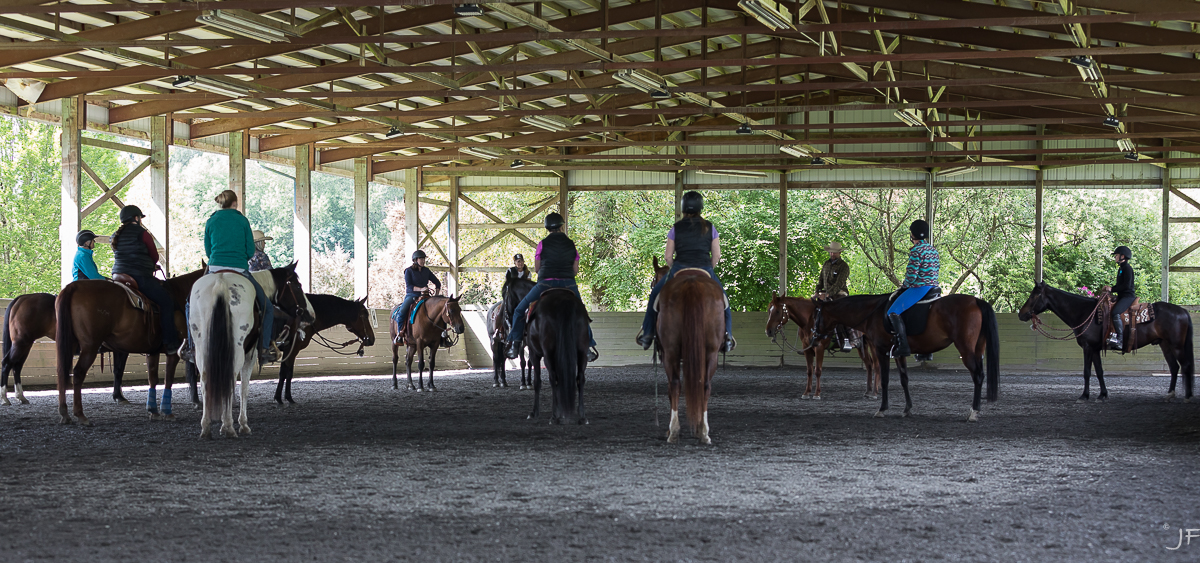
Are the organization's rules, restrictions and warnings (signage) conspicuously posted in easily accessible locations? Yes
Are the organization's emergency contacts, including veterinarian contact information, conspicuously posted in easily accessible locations? Yes
Are human and equine first aid kits easily accessible? Yes
Regarding all shelters where horses are housed including run-in sheds:
Do horses have assigned stalls in the barn/structure(s) or exclusively assigned shelter locations where they are separated from other horses with a barrier? Yes
How many hours per day, on average, are horses stalled or restricted to these sheltered exclusive shelter locations? 9-12
How often are the stalls/shelters cleaned, i.e., kept in good repair and free of standing water, accumulated waste, sharp objects and debris? 6-7 Days a Week
Do all stalls/shelters allow horses to lie down, stand up and turn around and provide protection from inclement weather (wind, sleet, rain, snow and extreme temperatures)? Yes
Are stalls/shelters kept in good repair, with adequate ceiling height, and free of standing water, accumulated waste, sharp objects and debris? Yes
Are floors constructed and maintained for both good drainage and traction? Yes
Is there a ventilation and circulation system in place to allow free flow of air to control temperature, and humidity, and to prevent air stagnation? Yes
Is wiring inaccessible to horses and maintained for safety in all areas of facility? Yes
Are fire prevention/protection measures (fire alarms, extinguishers and sprinkler systems) maintained and in good working order? Yes
Is there adequate lighting to ensure safety in all areas of facility? Yes
How many hours per day, on average, are horses turned out:
Equines are out 4 to 8 hours per day
Equines are out 24/7
The following describes the pastures at this facility:
This facility has a written plan in place for pasture management, which includes guidelines for seeding, fertilizing, irrigation, mowing, dragging, harrowing, manure removal, removal of debris, the control of poisonous plants, and a schedule for cleaning
A dedicated staff person(s) is responsible for pasture management
All pastures are fenced to prevent escape or injury
Electric fencing is used; electric wires or tape fence are visibly marked
Fencing checks, such as broken or missing planks, loose fence posts, exposed or loose nails, detached wires, etc., are done regularly
Pastures are rotated
Pastures have natural protection for equines (i.e., trees)
Pastures have man-made protection for equines (i.e., shelters)
Not Checked:
This facility does not have pastures where equines can graze on pasture grass
Barbed wire is used for fencing
This facility does not have pastures where equines can graze on pasture grass
Barbed wire is used for fencing
The following describes the turnout areas other than pastures at this facility:
This facility has a written plan in place for the maintenance of turnout areas, which includes a schedule for cleaning, manure removal, and dragging
A dedicated staff person(s) is responsible for the maintenance of turnout areas
All turnout areas are fenced to prevent escape or injury
Electric fencing is used; electric wires or tape fence are visibly marked
Turnout areas have man-made protection for equines (i.e., shelters)
Fencing checks, such as broken or missing planks, loose fence posts, exposed or loose nails, detached wires, etc., are done regularly
Not Checked:
This facility does not have turnout areas
Barbed wire is used for fencing
This facility does not have turnout areas
Barbed wire is used for fencing
The following policies and procedures are in place at the facility to restrict public access and to keep horses safe:
The property owner, staff member or caretaker lives on the premises and ensures that public access is restricted and is responsible for the security of the facility and equines
There is a mechanism in place to monitor equines overnight
By Appointment Only signs are posted.
No Trespassing signs are posted
Hold Harmless signs are posted
Entrance gates are locked at night
Visitors are only permitted at specific times
Visitors are only permitted in specific areas
The property is fitted with motion lights
The property is fitted with a security system that is monitored internally by staff (or the property owner)
The perimeter of the property is fully fenced
Not Checked:
A security guard is present at night
Authorized Personnel Only signs are posted
The property is fitted with a security system monitored by police or a professional service
A security guard is present at night
Authorized Personnel Only signs are posted
The property is fitted with a security system monitored by police or a professional service
Equine Care/Emergency Preparedness: Safe Harbor Stables (*Main) 2026 and 2025 This section is required.
Horse Health Care/Barn Management Records: What system is used to collect and store health/horse care records?
Onsite computer with cloud-based backup storage system
Our organization would use free cloud-based barn management software if available
The following items are consistent with our feed management plan and practices:
Equines are provided with individualized feeding plans, including supplements, according to the equine's age, breed/type, condition, size, work level and any health issues, consisting of nutritious food provided in sufficient quantity and access to adequate natural forage, or be fed daily, or as recommended by the organization's veterinarian
Feed plans are determined in consultation with a veterinarian
Supplement plans are determined in consultation with a veterinarian
Equines are fed grain in individual stalls
Equines are fed grain in groups
Staff and/or volunteers are trained in proper feed measurements and protocols and observed periodically to ensure they are feeding correctly
The feed chart is centrally located and updated as needed
The area(s) where hay, feed, grain, and supplements are stored are kept clean, free of debris and chemicals, and protected from weather and other animals in rodent-proof and mold-proof containers and grain bins
Feed, supplements and hay types are clearly labeled
Water sources, i.e., buckets, troughs, automatic waterers, etc. are kept clean, free of contaminants, debris and chemicals, protected from weather and other animals, and be positioned or affixed to minimize spillage.
Medications are kept in a secure area
Not Checked:
Is clean, potable water available at all times for all equines? Yes
Hoof Care: How often is hoof care provided for each equine? Every 4-8 weeks and when an issue arises
Dental Care: How often is dental care provided for each equine? Annually and when an issue arises
Horse checks: How often are equines visually and physically checked by personnel at the facility? Every day or 6 days a week
Our organization has the following parasite and fly/insect control protocols in place, including remedies used to control flies and insects:
Our organization follows the parasite control guidelines of our veterinarian, including fecal testing and de-worming
Fly/Insect Control Remedies:
Fly parasites
Fly Traps and Tapes
Premise Sprays/Insecticides
Fly Spray Repellent
Fly Masks
Fly Sheets
Not Checked:
The following represent the biosecurity practices in place at facility:
Our organization follows the biosecurity guidelines of our veterinarian
Sick, affected and/or quarantined equines do not have contact with other equines or other animals
The organization has a written biosecurity plan
Staff are trained in best practices related to biosecurity
Volunteers are trained in best practices related to biosecurity
A specific individual is trained and assigned to care for sick, affected and/or quarantined equines
Sick, affected and/or quarantined equines are cared for last if the caretaker must also care for healthy equines
Restricted access signs are posted at primary points of access to sick, affected and/or quarantined equines
Hand sanitizers are available at all primary points of access to sick, affected and/or quarantined equines
Footbaths are available at all primary points of access to sick, affected and/or quarantined equines
Manure and bedding from sick, affected and/or quarantined equines is removed from the facility - not put in open air piles, and not spread on pastures
Quarantine areas, such as stalls, aisle ways, paddocks, and common areas, are cleaned (and needed, disinfected) after conclusion of the quarantine.
Trailers/vans used by sick, affected and/or quarantined equines are cleaned and disinfected after each use and cleaning takes place away from where equines are sheltered
Equipment used by sick, affected and/or quarantined equines is not shared
Equipment used by sick, affected and/or quarantined equines is cleaned of organic debris and disinfected after each use
Latex gloves, or equivalent gloves, are worn when working with sick, affected and/or quarantined equines
Not Checked:
Equines are not quarantined on arrival.
Equines are not quarantined on arrival.
The following represent the manure removal practices in place at facility:
Manure is stored in dumpster(s)
Manure is hauled, sold or given away
Our organization adheres to the manure management guidelines set by the state, local authorities, and/or our organization's veterinarian
Not Checked:
Manure is piled in an area where equines are not located
Manure piles are covered
Manure piles are composted or spread on pastures
Manure is piled in an area where equines are not located
Manure piles are covered
Manure piles are composted or spread on pastures
The following steps are taken to help staff and volunteers readily identify each horse on the property:
Equines are assigned the same exclusive stall/shelter location each day
Name plates are located on the stall/shelter location
Photos are located on the stall/shelter location
A map/diagram is posted showing the location of each equine with equine names and photos
Equine photos and profiles are available on the website
Team leaders work with new staff/volunteers until they are able to identify the equines
Not Checked:
Equines wear halters with nametags
A notebook or binder with photos and information on each equine is easily accessible
Staff and volunteers are provided with an information packet with equine profiles, including photos and detailed descriptions
Staff/volunteers are provided training on conformation, markings, colors, and breeds
Equines wear halters with nametags
A notebook or binder with photos and information on each equine is easily accessible
Staff and volunteers are provided with an information packet with equine profiles, including photos and detailed descriptions
Staff/volunteers are provided training on conformation, markings, colors, and breeds
Our organization has the following policies and procedures in place pertaining to tack, apparel and equipment:
Saddles are shared
Saddle pads are shared
Blankets, sheets and turn out apparel are fitted and utilized for each equine appropriate to the equine's needs and the weather conditions
Blankets, sheets and turn out apparel are cleaned regularly as needed
Riding Tack is always cleaned at least weekly
Riding Tack is inspected for overall working condition before each use by trained personnel
Riding Tack is assessed for fit before each use by trained personnel
Riding Tack is assessed for fit by trained personnel when an equine's body condition changes
Riding Tack is assessed for fit by trained personnel when an equine's disposition changes
Assigned riding tack is clearly labeled
Riding Tack is stored in a climate-controlled location
Helmets are replaced after a fall
Helmets are replaced at least every five years.
Not Checked:
All equines have specifically assigned apparel, equipment and tack (saddles/bridles if ridden) that is not shared
Bridles are shared
Bits are shared
Blankets are shared
Sheets are shared
Turnout apparel is shared
Halters are shared
Riding Tack is always cleaned after each use
Riding Tack is cleaned only when needed
This facility enlists the services of a professional saddle fitter at least once a year
Helmets are shared
Helmets are cleaned/disinfected after each use
No equines are ridden; saddles, bridles, etc. not applicable.
All equines have specifically assigned apparel, equipment and tack (saddles/bridles if ridden) that is not shared
Bridles are shared
Bits are shared
Blankets are shared
Sheets are shared
Turnout apparel is shared
Halters are shared
Riding Tack is always cleaned after each use
Riding Tack is cleaned only when needed
This facility enlists the services of a professional saddle fitter at least once a year
Helmets are shared
Helmets are cleaned/disinfected after each use
No equines are ridden; saddles, bridles, etc. not applicable.
Emergency Preparedness: Safe Harbor Stables: *Main This section is required.
The following plans, policies, and procedures are in place at the facility to handle emergencies and address weather related issues, fire safety procedures, and/or any additional hazardous scenarios the facility could potentially experience:
Emergency procedures are posted prominently
The facility maintains at least two weeks of hay, feed, shavings and medications
The facility maintains appropriate liability and/or workers' compensation insurance
The organization has a written emergency preparedness/safety plan (EPP)
Not Checked:
The facility owns or has access to a generator
The facility collects and maintains medical information from staff, volunteers, and clients
The written EPP addresses the following areas: The facility owns or has access to a generator
The facility collects and maintains medical information from staff, volunteers, and clients
Local fire department and/or the state's emergency planning department procedures
Medical emergencies for clients, staff, and volunteers
Medical emergencies for equines
Evacuation plans
Power outages
Fire
Natural Disasters - thunderstorm, hurricanes, earthquakes, tornados, etc
Protocols to notify emergency personnel
Building/facility exit plans
Not Checked:
Terrorist attacks
Terrorist attacks
The facility follows the specific procedures to help PREVENT emergency situations:
Smoking is strictly prohibited
NO SMOKING signs are posted prominently
Hay is stored away from permanent or temporary structures where equines are stalled
Permanent or temporary structures where equines are stalled are kept free of dust, cobwebs, trash, cleaning rags, and other flammable items
Aisles and doorways are kept clear
Heaters with automatic shutoff settings are used
Not Checked:
How often are the following checked or performed?
Fire Extinguishers are checked: Monthly
Smoke detectors are checked: Monthly
Fence lines are checked: Daily
Turnout Areas are checked: Daily
Sprinkler systems are checked: Not at all/NA
Fire drills are conducted: Annually
Review of safety protocols with staff are conducted: Quarterly
Review of safety protocols with volunteers are conducted: Quarterly
The Emergency Preparedness Plan is reviewed and updated: Annually
Equine Transportation: 9= Onsite: 4 (4 + 0) + Offsite: 5
2-horse van/trailer with truck:
2 Owned onsite 3 Access offsite;
3-horse van/trailer with truck:
1 Owned onsite 2 Access offsite;
4-horse van/trailer with truck:
1 Owned onsite